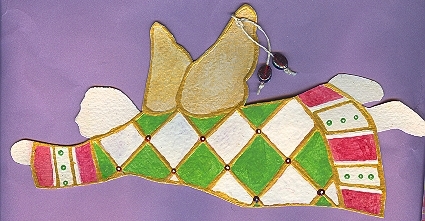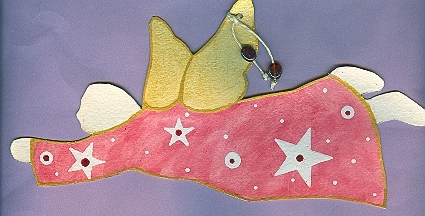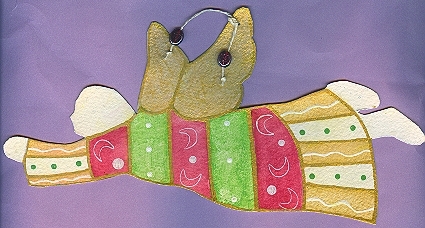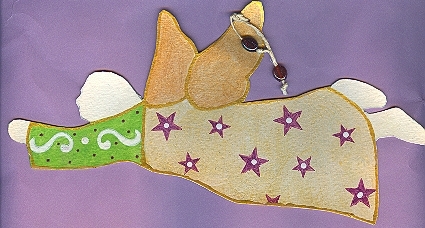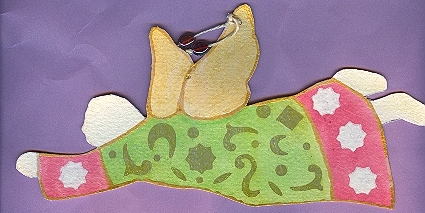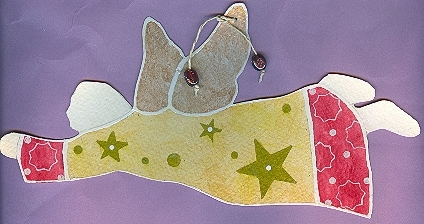(Remember this, peeps? From Christmas 2004 ….. uhm, how do I get myself into these situations?)
So, I’m going to hell. Yesterday, I had a phone conversation with my 4-year-old niece where I pretended to be Santa Claus.
Yup. And this blog is now my cyber confessional.
Here’s the scene: My sister and I were on the phone. In the background, I heard Piper saying she wanted to "talk on da phone." Now, she didn’t know who my sister was talking to, and once she said hello, something …. happened to me. I spontaneously, inexplicably found myself saying, in the single WORST man-voice imitation of all time, "Ho Ho Ho! Pii-perrr …. this is Saaanntaa!"
(When I re-enacted it later for My Beloved, he couldn’t look directly at me. He simply cringed and declared, "Uhh, you sound more like a ghost. Or the Movie Phone guy.")
But it’s TRUE. I DID.
So I truly thought there was no chance — NO CHANCE — that she’d fall for it. Of course, the jig would be up instantly. I mean, I’d never been able to fool her with a "voice" before. But then there was an audible gasp on the other end of the phone. I waited for her to say, chidingly, "Tee Tee, I know it’s you." But she didn’t. Her little, speech-classed voice excitedly said:
"Santa?! Hi, Santa!"
(Ohhhhhh, nooo. Flames of hell tickling my toes.)
I had a split second to decide. I was so sure she’d already be laughing at me and saying, "You so funny, Tee Tee." But once I realized she was actually believing me, I had to keep going. I mean, what was I going to DO? Stop in the face of such excitement and lamely say, "Ha ha ha. Just kidding, Piper"?
So girding my dubious wits for this festive fraud, I bellowed:
"Have you been a good girl, Pii-perrr?"
"Oh, yes, Santa. I be good," she breathed.
"Well, why don’t you tell Sanntaa what you want for Christmas?"
Holy MOLY, I sounded stupid. The hellfires were spreading. So was the sweat. At that point, I just prayed that she’d keep believing.
She said something I couldn’t quite make out, so I just replied:
"Welll, o-kaaay. Sanntaa is writing that down. What else do you want for Christmas, Pii-perrr?"
I almost cried when she said, simply, "Dust a toy."
I had to pause to take a breath.
"What kind of toy, Pii-perrr?"
"Dust a toy," she repeated.
I told her I was writing that down, too. I was about to lose it. I wasn’t sure if I’d melt into tears or laughter, but one of them was imminent.
"So, Pii-perrr, are you going to leave Sanntaa some cookies to eat?"
"Oh, yes, Santa. I wiw!"
"Ho Ho OHH, that’s good. Sanntaa likes cookies!"
(Seriously, Movie Phone guy, watch out.)
"Okay," she said softly.
Finally, I said, "O-kaay, Pii-perrr. I’m coming to your house on Christmas Eve. But you need to be asleep. Okaaay, Pii-perrr?"
"Oh, yes, Santa. I be sweeping for shore."
"That’s good. You make Sanntaa verry haappy. HO HO HO! Bye Bye, Pii-perrr!"
Oh …. Sweet …. Lord …. forgive …. me. Fraud over, I collapsed back on the sofa to catch my breath. My sister was back on the line.
"Oh, thank you for calling, Santa." I could tell she was stifling laughter. She was gently coaxing Piper to leave the room so we could talk, but apparently, my niece was frozen in place, a wide-eyed, open-mouthed statue.
I told my sister, "Tell her Santa needs to talk to mommy about some Christmas surprises." (Refer to forgiveness plea above.)
She did, and Piper bolted from the room. My sister was in hysterics.
"How did you do that without laughing?"
"I don’t know!" I wailed.
"I could hear you. That was the worst voice I’ve ever heard you do."
"I know!" I wailed.
"All those years of acting and THAT’S what you come up with?"
"I KNOW!" I wailed.
It’s true — it was simultaneously the best AND worst performance I’d ever done.
"Well, I don’t know how she bought it, but she did. Her eyes were bugging out of her head."
My sister called this morning with news of the aftermath of SantaScam 2004. Apparently, immediately after the phone call, my elated niece insisted on calling her Nana and Pop-Pop to tell them Santa had called. She’s also quite adamant about the cookies. My sister tried to fob off some fudge on Santa, but Piper would have none of it. "No, Mommy. Santa wants cookies. He tole me. He tole me!"
I know. I know. Santa’s going to hell.
And without any cookies, too.



